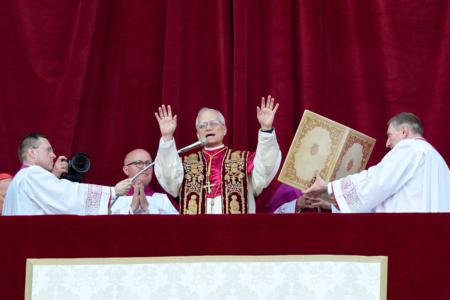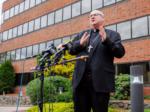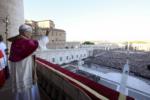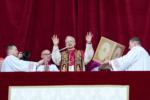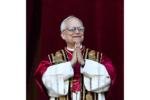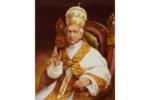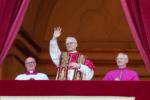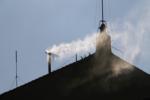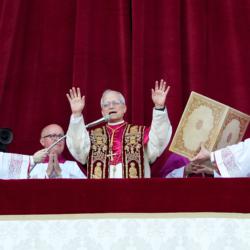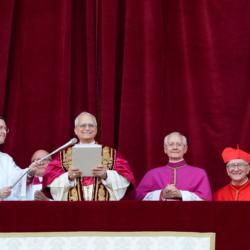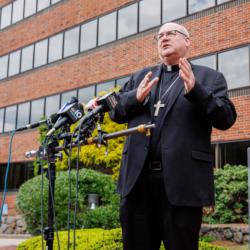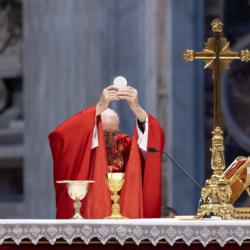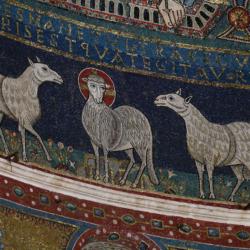Papal preacher: The Lord's power is his love, rejection of revenge
VATICAN CITY (CNS) -- God's power is the power of his humble, defenseless love, the papal preacher told Pope Francis and thousands of people gathered for the Liturgy of the Lord's Passion.
"It takes little power to show off; it takes a lot of power to put oneself aside and to conceal oneself. God is this unlimited power of self-concealment," as he emptied himself for humanity, Cardinal Raniero Cantalamessa said in his homily March 29 in St. Peter's Basilica.
"What a lesson for us who, more or less consciously, always want to show off. What a lesson for the powerful of the earth," especially those who pursue power only for power’s sake and those who "oppress the people and, in addition, 'call themselves benefactors,'" the cardinal said.
Presided over by Pope Francis, the service on Good Friday commemorates Christ's passion and death on the cross.
The pope arrived in a wheelchair and began the rite after a moment of silent prayer before the main altar, which was framed by covered scaffolding encapsulating the immense baldachin undergoing a 10-month-long restoration.
During the veneration of the cross, after the homily, the pope stood at his chair wearing a red stole and prayed in silence before kissing the cross. The cross was then brought before the main altar for veneration, and a long line of cardinals and a few members of the faithful processed before the cross to bow or genuflect and kiss Christ's figure. The pope then held the cross and lifted it briefly as the congregation knelt.
Following tradition, the homily was delivered by Cardinal Cantalamessa, preacher of the papal household.
He reflected on how Jesus overturned the worldly ideas people had of God and revealed his true face.
"Unfortunately, in our unconscious, we continue to carry on this very idea of God that Jesus came to change. We can speak of a God who is pure spirit, supreme being, and so on, but how can we see him in the annihilation of his death on the cross?" the cardinal asked.
"God is all-powerful, no doubt, but what kind of power is it?" he added. Jesus does not intervene to stop what is being done to him, but respects "to an infinite degree, the free choice of human beings."
"And so, the Father reveals the true face of his omnipotence in his Son who kneels before the disciples to wash their feet; in him who is reduced to the most radical powerlessness on the cross and continues to love and forgive, without condemning anyone," Cardinal Cantalamessa said.
"The omnipotence of God is the omnipotence of defenseless love," he said.
Jesus' passion and death on the cross was his way of telling the faithful that "after having suffered, we should not expect an external, visible triumph, such as earthly glory," he said. "The triumph is given in the invisible and is of an infinitely superior order because it is eternal!"
Conquering death, the Risen Christ does not seek revenge "to humiliate his opponents. He does not appear in their midst to prove them wrong or to mock their impotent anger," the cardinal said, because that "would be incompatible with the love that Christ wanted to bear witness to in his passion."
"The concern of the risen Jesus is not to confuse his enemies, but to go and reassure his dismayed disciples and, before them, the women who had never stopped believing in him," he said.
"Let us accept the invitation that Jesus addresses to the world from his cross: 'Come to me, all you who labor and are burdened, and I will give you rest,'" Cardinal Cantalamessa said.
"Come to me, you who are old, sick and alone, you whom the world lets die in poverty, hunger or while under bombardment; you who languish in prison cells because of your faith in me or your battle for freedom; come to me, you woman victim of the violence. In short, everyone, excluding no one: Come to me, and I will give you rest!" he said.
Pope Francis was scheduled later that night to preside over the Stations of the Cross in Rome's Colosseum.
The theme for the meditations for the 14 stations was "In Prayer with Jesus on the Way of the Cross." The commentaries and prayers were written by Pope Francis and were meant, during this Year of Prayer, to "accompany" Jesus on his own journey of prayer during his passion.
The text of the commentary and prayers on the 14 Stations of the Cross was published March 29 on the Vatican website.
